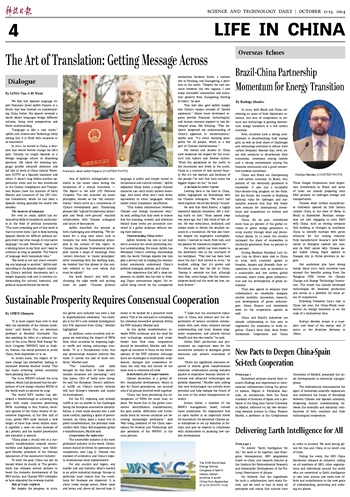
Spanish Prime Minister Pedro Sanchez had visited China in September. In his meeting with Sanchez, President Xi Jinping said China and Spain should fully utilize platforms such as the Joint Commission on Science and Technology to jointly promote development in high-tech fields such as AI, digital economy and new energy for mutual benefit and win-win results.
Ten cooperation agreements have been signed between Chinese and Spanish research institutions and technology companies on the occasion of the 2024 China-Spain Science and Technology Cooperation Theme Day, observed at the University of Zaragoza in Zaragoza, Spain, on September 25.
The world today is undergoing unprecedented changes, driven by a new wave of scientific and technological revolution and accelerated global industrial transformation, Chinese Science and Technology Vice Minister Chen Jiachang said in a video message.
Countries around the world should not only share the opportunities brought by rapid technological development, but also collaborate to address global challenges.
"Over the past few years, China-Spain relations have progressed smoothly, resulting in multiple fruitful outcomes in practical cooperation. Both sides have jointly released five batches of guidelines for intergovernmental joint research projects, supporting 30 collaborative research projects. Cooperation between the institutions of the two countries is also deepening," Chen added.
Both Yao Jing, Chinese ambassador to Spain, and José Antonio Mayoral, rector of the University of Zaragoza, expressed their shared vision for deepening Sino-Spanish cooperation in science and technology.
The event, themed "China-Spain Science and Technology Cooperation for the Future," brought together government officials, academics, and business representatives from both countries to deepen mutual understanding in their scientific and industrial communities.
Chen invited Spain's academic, scientific, and business communities to visit China. "We hope you can experience our local culture, as well as our advancements in science and technology. Your visit will greatly contribute to the enduring friendship between our two countries and peoples, help us address global challenges together, and promote the well-being of all," he said.
The four sub-forums organized for the event focused on AI, biotechnology, advanced materials, and renewable energy with discussions, exhibitions and cooperation matchmaking.
Renowned scholars shared their research findings and experiences in international collaboration during the plenary session. Miguel A. Fernández Sanjuán, an academician from the Royal Academy of Sciences of Spain and a professor at the King Juan Carlos University in Madrid, reflected on his two-decade-long research journey in China. Nazario Martín, a professor at the Complutense University of Madrid, presented the latest developments in molecular nanographene.
The deliberations demonstrated the spirit of borderless scientific exploration and reinforced the bonds of friendship between Chinese and Spanish scientists, deepening mutual understanding between the scientific and industrial communities of both countries and their technological cooperation.







